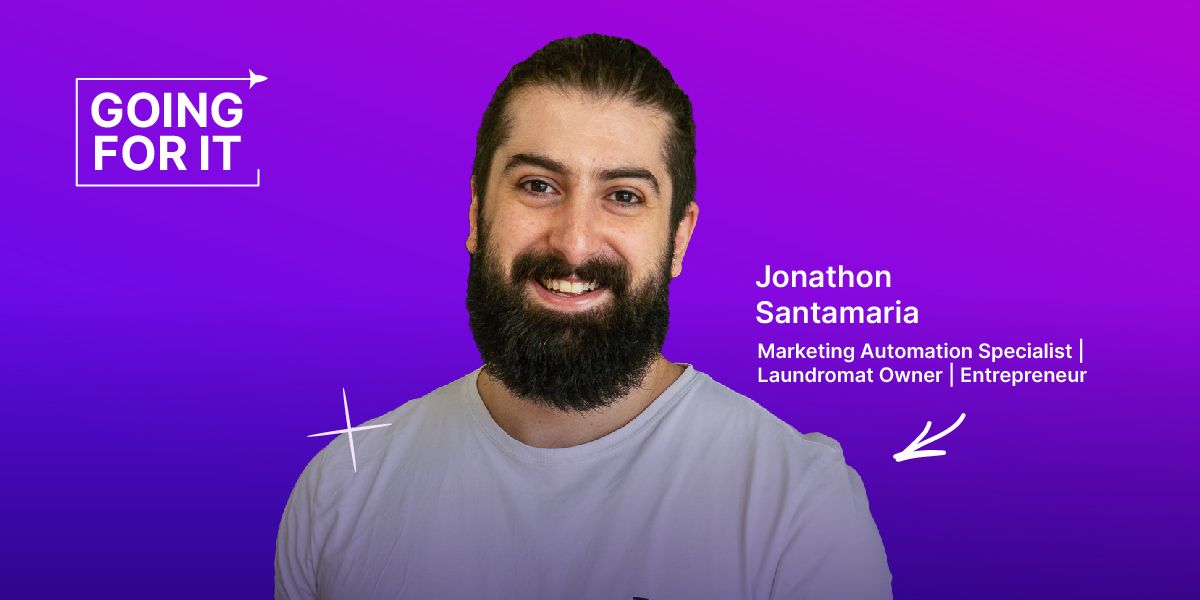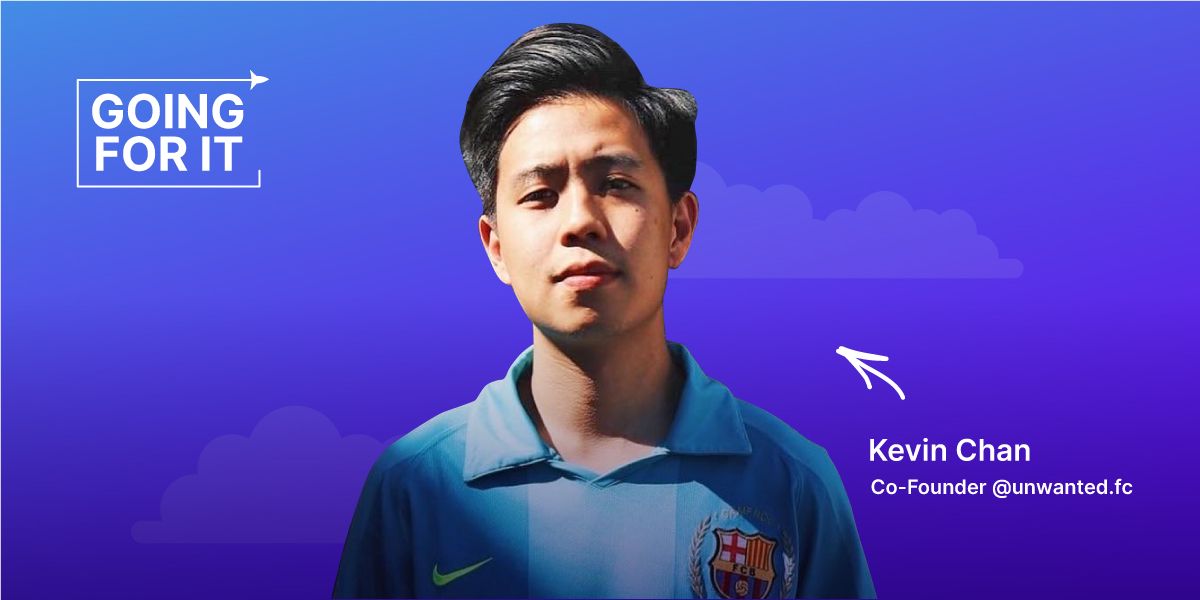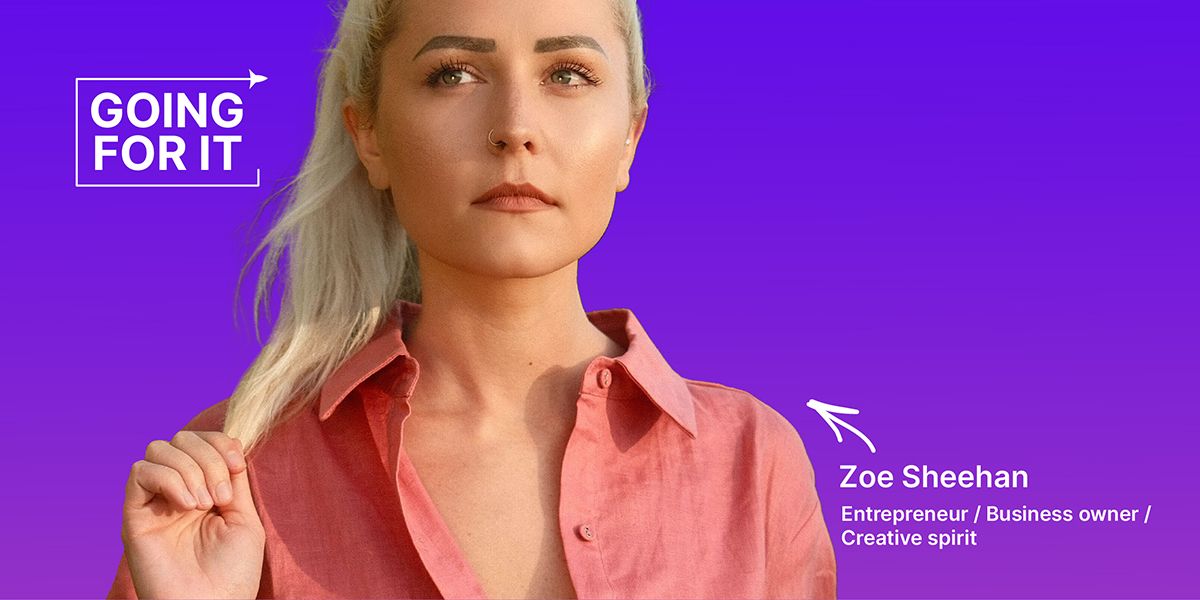Going For It is our Spaceship series where we speak to people who are doing just that — going for it. Whether in business, sport, the arts or anything in between, we share stories about people who are invested in achieving big feats (and changing lives in the process).
For Melanie Leahy and Elisse Alexander, Going For It meant rejecting the algorithms, battling for equity, and creating their own dating app startup Ziinkle all in the name of connection.
When Melanie Leahy got out of a long-term relationship, she did what any Gen Z or Millennial woman would do – grabbed her wingwoman Elisse Alexander and took to ‘the apps’.
“Ultimately, I wanted to meet someone in real life.”
“When you're in a relationship for so long, it's really confronting to kind of put yourself back out there,” said Melanie. “Where do you go? What are singles doing these days?”
Melanie’s colleagues had told her to download apps like Bumble and Hinge.
“It was a novelty for, you know, a few months, but quite quickly, I just became really frustrated, because I found it really difficult to make a connection.”
“There's a lot of ghosting, a lot of surface level chit-chat.”
“And ultimately, things just didn't really go anywhere. And for me, ultimately, I wanted to meet someone in real life.”
“This is too hard. Let’s go out and meet someone IRL.”
Meanwhile, Elisse, who’d been married for ten years, was doing what every married person loves to do: swiping vicariously through Melanie’s apps.
“I've never experienced dating apps,” said Elisse.
“So when Mel was single, I'm like, "Oh, let me have a go because this is a novelty.”
“So you know, I'm swiping, I'm zooming in to see who’s around.”
“But when I really sat down and thought about it, I'm like, well, actually, how are you supposed to meet someone through this? Because I don't understand. Does this person look like their first photo? Or their third photo? And what do they sound like? And what is their height?”
“And Mel kept saying, “How do I reply to this person? What's a good conversation starter with this person?” Elisse continued.
“I'm like, “You know what, this is too hard. Let's go out and meet someone normally.””
Every woman needs a wing woman
Melanie and Elisse had met one another at work, where they’d immediately clicked, bonding over a shared love of marketing and thinking big. It was natural they’d use their complementary professional skills – Melanie’s in mass-market advertising, and Elisse’s in 1:1 content marketing and thought leadership – to attack Melanie’s dating problem.
“Because we’d both been in relationships for so long, we didn't know where the best places to go for our age group were anymore,” said Elisse. “So we’d try a whole lot of places and the crowd would be too old, too young, or there'd be no one there. And with our backgrounds in business marketing, we knew that was an issue.”
They started using Instagram Stories to scout for the venues with the most promising prospects and best vibes in real-time, then jumped in taxis to race to them.
“Just because an algorithm says a person is the best person for you, it doesn't necessarily mean that a connection, or chemistry is there.”
Melanie and Elisse were having a lot more fun scouting for promising connections across Sydney than they had been on Melanie’s dating apps. They’d also uncovered a business problem – that there were empty bars across Sydney – and a solution that seemed obvious to them: that filling the right venues with the right singles would be a perfect match – and there could be an app for that.
Ziinkle, they imagined, could let users know when other users were out, about, and ready to meet other like minded singles. It could partner with other businesses to fill their venues, and ultimately help humans make meaningful connections that last.
It could be a dating GPS that helped singles be in the right place at the right time.
“There's nothing like meeting organically and you know, having that eye contact across the bar,” explained Melanie. “And really, we help engineer serendipity.”
“We asked 1100 participants, what are the 20 most important things to you when looking for a partner?”
“75% of relationships that are formed on dating apps fail,” said Elisse. They surveyed singles and found that for both males and females, the most important thing was chemistry and connection.
Source: 2023 Ziinkle Dating Insights and Relationships Insight Report
“At the end of the day, there's nothing that beats that real life, chemistry and connection,” said Elisse.
“All our competitors, their algorithms, their whole platform is based on physical looks, because you are swiping and judging based on somebody's profile. You cannot have a physical connection with a photograph.”
How do you go from having a good idea for an app to actually having an app, and investors?
“We spent a lot of time in my apartment literally on the floor, sketching out wireframes. Asking questions like, “What would it look like? Where are the buttons? What are they doing?”” said Melanie.
The pair acknowledge they were lucky that Elisse’s dad could introduce them to a business partner who had broad connections in startups and investing. They put three slides together and showed it to the business partner, who expressed enthusiasm at their initial idea, but pointed out all of the gaps that still needed to be filled. He helped them put an information memorandum together, and eventually became their first investor.
“It was this kind of snowball effect,” said Melanie, “where we just took action, and by doing something like having a conversation or working on a presentation or getting our first investor, it just opened up a lot of other doors through their connections and through their networks.”
It takes more than one investor
Startup funding tends to work by founders and businesses pitching their ideas to ‘venture capital’ (VC) firms, who have a large but limited amount of capital to pick and choose which businesses get funded. Startups generally rely on VC funding to survive until they grow big enough to be self-sustaining.
In 2022, as reported in Women’s Agenda, just 3% of Australian VC funding went to all-women-founded startups like Elisse and Melanie’s. Only 10% of funding went to teams with women in them at all.
The flow-on effect is real. As reported by Entrepreneur magazine, by February 2022, fewer than 30 female founders had ever taken a company public, which means there were less female-founded businesses for the broader public to invest in. In the Spaceship Voyager managed portfolios, for example, only Adore Beauty is female-founded, while Doximity and Cloudflare have at least one female co-founder.
Being a female founder in the tech startup world is a double-edged sword.
“From a PR perspective, people want to hear the stories of females succeeding in this space,” said Elisse. “So we can use that to our advantage. Obviously, there are a lot of grants and things that go to females. So that's another advantage we've got there.”
“The way it holds us back, though, is that a lot of big investors are male and from an older generation. So they prefer (investing in) the FinTech space, or, you know, B2B SaaS.”
It’s 2023 and it still takes a man on the team to get a seat at the table
“We are a consumer brand. We do have a B2B arm, but we're primarily consumers, and we are female. And it's a dating app. It's things that they (legacy investors) don't necessarily understand because dating apps weren't around when they were younger,” said Elisse.
“So it is, first of all, getting them to speak to us.”
“We had to, at the beginning, bring out the director, Sam, who is an older male, to our meetings, just to say “Hey, we have an older male here, you can trust us!” just to get those meetings.”
“But we've even found in those meetings, a lot of those investors will speak directly to him rather than to us. And I don't know if that is just our experience, but it is very disheartening that we are treated as, you know, young girls, rather than equals, because we've had this idea, we've done this work.
We've also found that funding is harder for females. So if you look at the AFR, every week, there's an article about two men who have launched a FinTech, two guys who have done this. When do you ever hear of stories of two females who have done anything in those publications?”
Creating an investor army
Melanie says they’ve had to be creative to address the funding imbalance.
“I think one of the main things (Ziinkle has done) is being able to run a crowd equity campaign which is really important because it gives the opportunity to everyday people and everyday Australians to invest in the brands that they love and that they believe in.”
“And so for us, having the community come in and support us, is really important, because obviously, yes, they help us generate the capital, but they also become users and part of our community, or they tell their friends, and so it actually creates a really great halo effect around brand awareness.”
“But ultimately, being able to have a crowd equity raise means that it's open up to all people. And that also gives more women the opportunity to invest in companies, which they might ordinarily not have known about or not had access to, as well.”
At Spaceship we think that long-term investing is about building a life for yourself and others that you want to live in. What life are Melanie, Elisse, and Ziinkle investing in?
“It's really around just helping people live their most fulfilling lives,” said Melanie.
“When it comes from a social wellbeing perspective, and a mental health perspective, being able to connect people in real life just helps eliminate and reduce so many of those pressures that we feel, in a Metaverse, or in a digitally connected community.”
“Technology is amazing. It has really great applications. But unfortunately, as humans, we sometimes don't use it in the best way that's going to impact our mental health and our social well being. So (we’re really investing in) being able to give back to people and help them live their most fulfilling lives,” said Melanie.
Going For It is our Spaceship series where we speak to people who are doing just that — going for it. Whether in business, sport, the arts or anything in between, we share stories about people who are invested in achieving big feats (and changing lives in the process). Keep following Melanie and Elisse’s story at the Ziinkle Instagram page.
The information in this article is prepared by Spaceship Capital Limited (ABN 67 621 011 649, AFSL 501605). It is general in nature as it has been prepared without taking account of your objectives, financial situation or needs.



